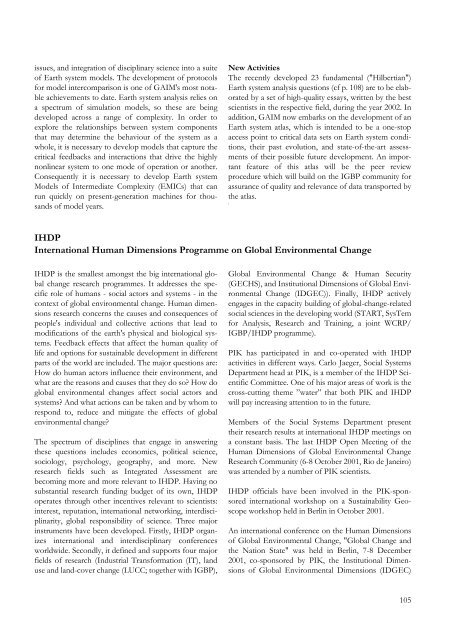PIK Biennial Report 2000-2001 - Potsdam Institute for Climate ...
PIK Biennial Report 2000-2001 - Potsdam Institute for Climate ...
PIK Biennial Report 2000-2001 - Potsdam Institute for Climate ...
You also want an ePaper? Increase the reach of your titles
YUMPU automatically turns print PDFs into web optimized ePapers that Google loves.
issues, and integration of disciplinary science into a suite<br />
of Earth system models. The development of protocols<br />
<strong>for</strong> model intercomparison is one of GAIM's most notable<br />
achievements to date. Earth system analysis relies on<br />
a spectrum of simulation models, so these are being<br />
developed across a range of complexity. In order to<br />
explore the relationships between system components<br />
that may determine the behaviour of the system as a<br />
whole, it is necessary to develop models that capture the<br />
critical feedbacks and interactions that drive the highly<br />
nonlinear system to one mode of operation or another.<br />
Consequently it is necessary to develop Earth system<br />
Models of Intermediate Complexity (EMICs) that can<br />
run quickly on present-generation machines <strong>for</strong> thousands<br />
of model years.<br />
New Activities<br />
The recently developed 23 fundamental ("Hilbertian")<br />
Earth system analysis questions (cf p. 108) are to be elaborated<br />
by a set of high-quality essays, written by the best<br />
scientists in the respective field, during the year 2002. In<br />
addition, GAIM now embarks on the development of an<br />
Earth system atlas, which is intended to be a one-stop<br />
access point to critical data sets on Earth system conditions,<br />
their past evolution, and state-of-the-art assessments<br />
of their possible future development. An important<br />
feature of this atlas will be the peer review<br />
procedure which will build on the IGBP community <strong>for</strong><br />
assurance of quality and relevance of data transported by<br />
the atlas.<br />
IHDP<br />
International Human Dimensions Programme on Global Environmental Change<br />
IHDP is the smallest amongst the big international global<br />
change research programmes. It addresses the specific<br />
role of humans - social actors and systems - in the<br />
context of global environmental change. Human dimensions<br />
research concerns the causes and consequences of<br />
people's individual and collective actions that lead to<br />
modifications of the earth's physical and biological systems.<br />
Feedback effects that affect the human quality of<br />
life and options <strong>for</strong> sustainable development in different<br />
parts of the world are included. The major questions are:<br />
How do human actors influence their environment, and<br />
what are the reasons and causes that they do so? How do<br />
global environmental changes affect social actors and<br />
systems? And what actions can be taken and by whom to<br />
respond to, reduce and mitigate the effects of global<br />
environmental change?<br />
The spectrum of disciplines that engage in answering<br />
these questions includes economics, political science,<br />
sociology, psychology, geography, and more. New<br />
research fields such as Integrated Assessment are<br />
becoming more and more relevant to IHDP. Having no<br />
substantial research funding budget of its own, IHDP<br />
operates through other incentives relevant to scientists:<br />
interest, reputation, international networking, interdisciplinarity,<br />
global responsibility of science. Three major<br />
instruments have been developed. Firstly, IHDP organizes<br />
international and interdisciplinary conferences<br />
worldwide. Secondly, it defined and supports four major<br />
fields of research (Industrial Trans<strong>for</strong>mation (IT), land<br />
use and land-cover change (LUCC; together with IGBP),<br />
).<br />
Global Environmental Change & Human Security<br />
(GECHS), and Institutional Dimensions of Global Environmental<br />
Change (IDGEC)). Finally, IHDP actively<br />
engages in the capacity building of global-change-related<br />
social sciences in the developing world (START, SysTem<br />
<strong>for</strong> Analysis, Research and Training, a joint WCRP/<br />
IGBP/IHDP programme).<br />
<strong>PIK</strong> has participated in and co-operated with IHDP<br />
activities in different ways. Carlo Jaeger, Social Systems<br />
Department head at <strong>PIK</strong>, is a member of the IHDP Scientific<br />
Committee. One of his major areas of work is the<br />
cross-cutting theme ”water” that both <strong>PIK</strong> and IHDP<br />
will pay increasing attention to in the future.<br />
Members of the Social Systems Department present<br />
their research results at international IHDP meetings on<br />
a constant basis. The last IHDP Open Meeting of the<br />
Human Dimensions of Global Environmental Change<br />
Research Community (6-8 October <strong>2001</strong>, Rio de Janeiro)<br />
was attended by a number of <strong>PIK</strong> scientists.<br />
IHDP officials have been involved in the <strong>PIK</strong>-sponsored<br />
international workshop on a Sustainability Geoscope<br />
workshop held in Berlin in October <strong>2001</strong>.<br />
An international conference on the Human Dimensions<br />
of Global Environmental Change, "Global Change and<br />
the Nation State" was held in Berlin, 7-8 December<br />
<strong>2001</strong>, co-sponsored by <strong>PIK</strong>, the Institutional Dimensions<br />
of Global Environmental Dimensions (IDGEC)<br />
105

















